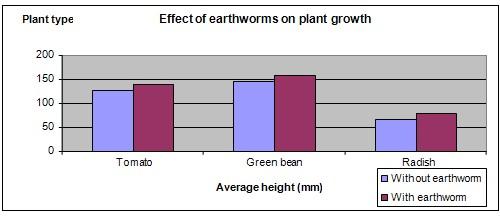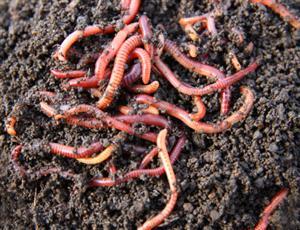| Complexity level: | 6 |
| Project cost ($): | 20 |
| Time required: | 1 day to prepare, 8 days for observation |
| Material availability: | Look for earthworms in your garden. The seeds may be obtained from a nursery. |
| Safety concerns: | None |
Hypothesis
The presence of earthworms in soil will help plants grow faster.
Overview
Earthworms and plant growth
The earthworm is a type segmented worm that lives in soil. They burrow holes in the ground and create networks of tunnels as they move inside the soil, and this helps aerate the soil. The size of the burrows depends on the diameter of the earthworm and this can range from 1mm to 10mm. These networks of tunnels by the earthworms help the soil to absorb more water during rainfall and thiss reduces the erosion caused by surface runoff.
Earthworms feed on soil and decaying organic matter in the ground. A single acre of land may have as many as 1 million earthworms and each worm can digest the equivalent of their bodyweight of soil and organic matter everyday. This helps to increase the turnover of decaying organic matter in the ground which the plants can absorb and reuse.
The organic matter and soil that is digested by the earthworms are returned to the soil as castings. Casting are very rich in nutrients and beneficial to plant growth. They consist of organic and inorganic materials that are broken down by the bacteria and enzymes found in the digestive tracts of earthworms. Earthworms also help by feeding on the organic material on the top layer of the soil and later redepositing the castings deeper into the soil, in closer proximity to the roots of plants.
Scientific Terms
Materials
The materials required for the experiment:
- 1 packet of tomato seeds
- 1 packet of green bean seeds
- 1 packet of radish seeds
- 6 small plastic pots
- Soil to fill 6 pots
- 30 earthworms
- Tap water
- 1 measuring cylinder
- Ruler (1 meter)
Procedure
1. For this experiment, the independent variable is whether or not the earthworms were present in the soil. The dependent variable is the height of the plants after 8 days. This is determined by using a ruler to measure the height of the 10 plants in each pot and calculating their average height. The constants (control variables) are the environment the plants are kept in (temperature, humidity, light, etc), the size of the pot, the type of plants (namely, tomato, green beans and radish) and the type of soil.
2. The pots are labeled “tomato”, “green beans”, “radish”, “tomato-worm”, “green beans-worm” and “radish-worm”. The soil is inspected and any earthworms removed. The same amount of soil is filled into each pot. 10 earthworms are added in each of the 3 pots labeled with “worm”. 10 tomato, green bean and radish seeds are planted in each of the 6 pots according to the markings on the pot.
3. The plants are watered once a day with the same amount of water and placed where they can get enough sunlight to grow.

Results
It is observed that the tomato, green bean and radish plants grown in soil containing earthworms grew taller than the plants that grew in soil without earthworms.
| Condition | Average height of plant after 8 days (mm) | ||
| Tomato | Green bean | Radish | |
| Without earthworms | 128 | 146 | 67 |
| With earthworms | 139 | 158 | 79 |
se the below graph to plot the results of the science fair project.

Conclusion
The hypothesis that the presence of earthworms in soil will help plants to grow faster is proven to be truecorrect.
The presence of earthworms is very important for a healthy garden. The manure produced by earthworms increases the nutritional content of the soil. The burrowing activity of the worms helps to aerate the soil, allowing better air flow and rain water absorption by the soil. They also help to redistribute nutrients to different layers of the soil. Earthworms are an integral part of the eco-system in our gardens.
Also consider
What would happen if the experiment was repeated using other types of seeds like corn or sunflower?
The experiment can be repeated by varying the amounts of moisture in the soil by watering and not watering some plant.
References
How do earthworms affect plant growth - http://www.ehow.com/how-does_5133420_do-earthworms-affect-plant-growth.html
Earthworm soil conditioner: improve your soil - http://www.essortment.com/all/earthwormssoil_rmkf.htm

